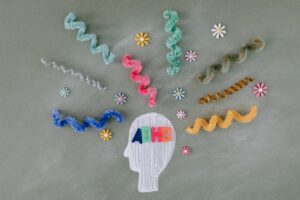Lazy and Dumb, or Something Else Entirely?

Why is everything so difficult for me? I need to stop being lazy and do something in my life, be productive- like everyone else, but I can’t. Why can’t I ever finish anything I start? I’m such a failure and lack the energy and motivation to complete anything. Why am I so forgetful and keep on losing my belongings and train of thought? I can’t keep track of anything. Why can’t I just bear down and focus? I’m so stupid, I’ll get nowhere in life like this, nobody will employ me. I have no self-control or sense of discipline, exceeding every deadline. Why can I not follow the simplest of directions and
routines? I feel trapped and suffocated by all the rules and expectations. I loathe school/ work. I would give anything to be a normal, productive and functioning human being. Something is wrong with me.
These were my recurring thoughts and feelings about myself and all I was capable of or rather incapable of. My self esteem before being medically diagnosed with ADHD was directly related to my grades. My grades and academic performance were abysmal, my knowledge somehow never quite reflecting in my grades. Ironically I grew up a shy and introverted kid, surrounded by multiple fiction and fantasy sagas that I could inhale in a matter of hours, without taking breaks- yet the same never seemed to apply to academic resources and school books, which frustrated me to no end. I didn’t fit the stereotypical portrayal of a hyperactive and impulsive child, I grew up a lost kid, preoccupied in my own world, who loved reading, lazing around and daydreaming.
It was until the age of 16 that I could put a name to my struggle and suffering, realize that it wasn’t typical and that it wasn’t my fault. It made me acknowledge my troubles with paying attention, being calm and staying still, and controlling my thoughts, actions and reactions, weren’t because I was dumb, or lacked motivation and self discipline. And that ADHD is a serious condition that affects the manner in which a person’s brain develops and functions.
Neurodivergence is a spectrum of divergence in mental or neurological function from what is considered typical or normal, under which ADHD falls. It is often used in the context of neurodiversity, which is the concept that there are a variety of ways that people’s brains process information, function, and present behaviorally. Neurodivergence includes conditions like autism spectrum disorder (ASD), attention deficit hyperactivity disorder (ADHD), learning disorders and more.
A medical diagnosis of neurodivergence can completely change one’s outlook on life. For me, It influenced how I viewed myself and my condition and how people around me treated me. Other ways it affected me are:
– I felt more validated and understood by having a label that explains my experiences and challenges.
– It made me feel more empowered and proud once I embraced my differences, limitations and strengths as part of neurodiversity.
– It helped me feel more hopeful and supported, being able to access resources and communities that cater to my needs, doubts and interests.
Ultimately, a medical diagnosis of neurodivergence is not a definitive or fixed label, but a way of understanding myself and my needs better. It helps me find ways to thrive and contribute to society in my own unique way. Neurodivergence is not a defect or a disorder, but a natural variation in human brains. It simply means that we may face challenges and difficulties in certain areas of life, but might also have strengths and abilities that are unique and valuable. Neurodivergence is now a source of identity and pride for me, having embraced my differences and human diversity.
Hiya Khanna